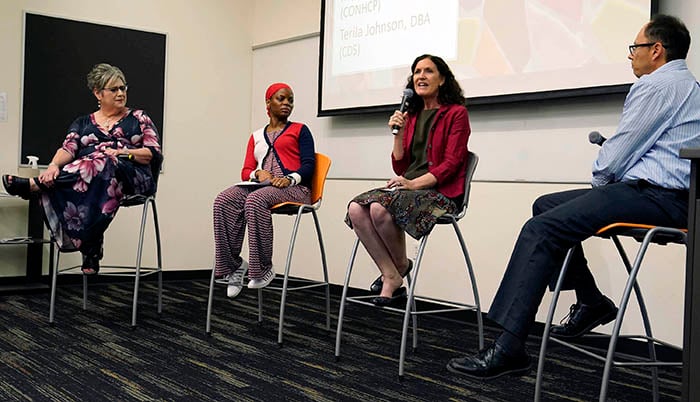
Story by Rick Vacek
Photos by Ralph Freso
GCU News Bureau
Human flourishing and human suffering.
They hardly seem to go hand in hand. One is the bright sunshine of God’s love, the other is the inevitable storms of life.
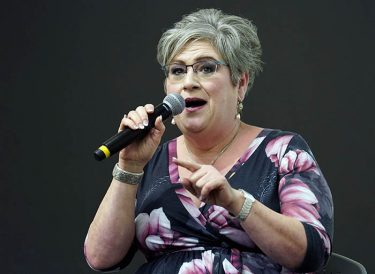
But this year’s One Foundation panel discussions put those two polar opposites under the same umbrella of faith and hope, soothed by these words of wisdom from Denise Matus of the College of Nursing and Health Care Professions:
“Peace is always louder than chaos.”
The six one-hour sessions for Grand Canyon University faculty (livestream links are below) had the overall title of “Human Flourishing: Embracing Our Purpose.” In the last one, “Flourishing in a Fallen World,” Matus shared an experience she had while working in a neonatal unit.
She was new on the job, which made her all the more determined to save a baby born with numerous health issues. When the baby didn’t survive, she went off to another room and cried even though the family praised her actions.
But that’s when flourishing happened in what might be considered an unusual way. The director of her unit sought her out and praised her work in trying to save the baby, emphasizing that she did things that can’t be taught.
“As a nurse, you internalize it a lot and take it upon yourself. But you also have to look at it this way – there’s a higher purpose and a higher power involved,” she said. “That situation could have gone so bad, but he turned it around to make it such a powerful moment for me. I really thank God for him.”
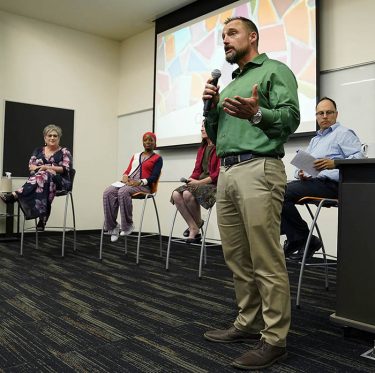
It was indicative of the lessons learned from College of Theology (COT) faculty, who began each session, and the panelists from other colleges who spoke during the second half-hour. The idea is to provide examples that attendees, both in person and online, can apply to their own classrooms no matter what their educational discipline.
The topic flourished largely because of the panelists.
“It’s been fascinating to watch the personalities as they’ve interacted with it. You’ve got the content expertise, but you also have the personalities,” COT Dean Dr. Jason Hiles said. “The way they processed it and thought about it, it was really rich. People were working through it, almost as if they live it every day.”
That’s because, well, we all have lived through it the last two years.
“There’s this sense that flourishing is fragile, and there’s a sense that a lot of things are changing quickly,” Hiles added. “There’s not a lot that is certain right now, globally or locally. So there’s a sense that, ‘My goodness, I’m not sure what’s going on, but it feels like there’s a new crisis every few weeks.’
“I think people were really playing off of that and thinking about the way students are processing that amount of change in a short amount of time. You can hear it. It’s implicit. Sometimes it’s explicit – they’d bring out the things that are happening on the world stage. I think COVID was mentioned in every panel.”
Dr. Karen Denzler, on the panel with Matus, brought another perspective from the College of Science, Engineering and Technology:
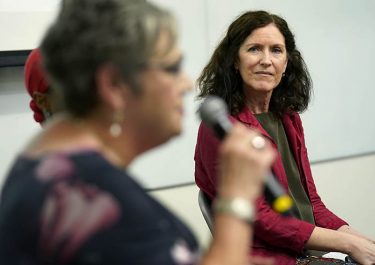
“Initially, we start out thinking that in science we want to develop technologies, things that help people,” Denzler said. “So if I’m looking at drug development or stopping a cancer cell from developing, stopping a microbial infection – of course those are places where we take our technology, to try to help people. But then when we look at the reason we’re developing these technologies, it’s because we have suffering. And so how do we get through that? Because we will have suffering.
“It is this relationship with God through Jesus Christ that helps us have a different outlook on life. All the stuff here, we’re not going to take with us, but we’re going to take the people. Once we have that relationship with God set, loving the people is what we do next. That’s really imperative to our lives.”
That’s what the third member of the panel, Dr. Terila Johnson of the College of Doctoral Studies, emphasized. She devotes her work with doctoral learners to helping them flourish.
That means meeting with nine of them every Saturday to talk about flourishing. It means praying with the learner at the start of every phone call and then looking for ways they can flourish.
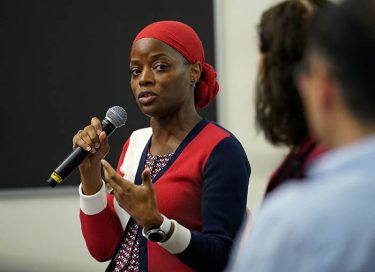
“Meet them where they are,” she said.
It also means trying to help a colleague struggling with faith, simply by listening. “She accepts me for being all the way in,” Johnson said. “I’m going to treat her the same.”
Dr. Armen Oganessian, a member of the COT Online Full-Time Faculty, moderated two panels and was struck by the dedication of faculty from other colleges.
“They take it seriously,” he said. “They don’t go, ‘Oh, it’s Monday. I have that thing.’ They think about it. They take time to do it. They really do care about how they’re helping the people in front of them.”
It also got him thinking about the role flourishing plays in his work and in his everyday life:
“I can’t say the classroom is separated from my Christian life, and I can’t say my friendships are separated from my church life, which is separated from my world view. All those things are connected.
“I want to flourish; following Christ leads to flourishing. But I was really helped by the practical outworkings of, ‘This is my ideology, and it has trickled down into my everyday interactions with students and other people.’”
Hiles also spoke highly of the two other sessions in the spring semester, “Flourishing within an Academic Discipline” and “Flourishing within a Vocation.”
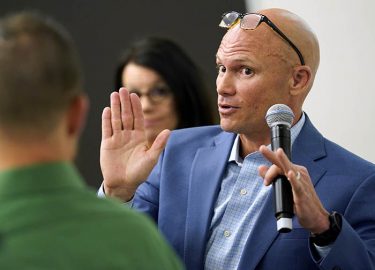
“It wasn’t autobiographical, it was reflective,” he said. “People were saying, ‘Wait a minute. I never stopped to think about what we’re doing together in quite these ways.’
“It felt like those were pretty personal. It wasn’t just a great time to get together and learn. It was all of a sudden, ‘Now you’re talking about the place I live in. This is a little different.’”
Said Denzler, “I enjoy hearing other people’s perspectives, whatever the topic is. It’s like the physical body has a lot of parts, and then the spiritual body has a lot of different people with a lot of different perspectives. And so that’s good for me, to grow and to listen to other people.”
The experience has Johnson looking for ways she can spread God’s Word beyond her work as a doctoral chair. She’s planning to start a master’s program in Christian ministry in the fall even though she already has a doctorate.
One of the things she likes best about GCU is the way it promotes faith formation. And in the classroom, that starts with the instructor leading the students in prayer.
“I just think GCU is going to make a major mark in Christian higher education,” she said.
Matus closed her panel discussion with another truism.
For Christians, she said, “This is as close to hell as we will ever get.”
And for nonbelievers, “This is as close to heaven as they will ever get.”
The quest for human flourishing can bring the two groups closer together. It starts with a conversation and then, as Denzler put it, “Everything we’re dealing with, God knows about, so we’re seeking His guidance with these things.”
After all, He’s the one who offers the true peace.
Contact Rick Vacek at (602) 639-8203 or [email protected].
****
One Foundation livestreams, 2012-22:
Sept. 20: Flourishing According to the Sermon on the Mount
Oct. 18: Flourishing in the Late Modern World
Nov. 15: Flourishing through Following Jesus
Jan. 24: Flourishing within an Academic Discipline
Feb. 28: Flourishing within a Chosen Vocation
March 28: Flourishing in a Fallen World
****
Related content:
GCU Today: Providing a strong Foundation for Christian teaching
GCU Today: Survey: GCU's Christian foundation is far-reaching















